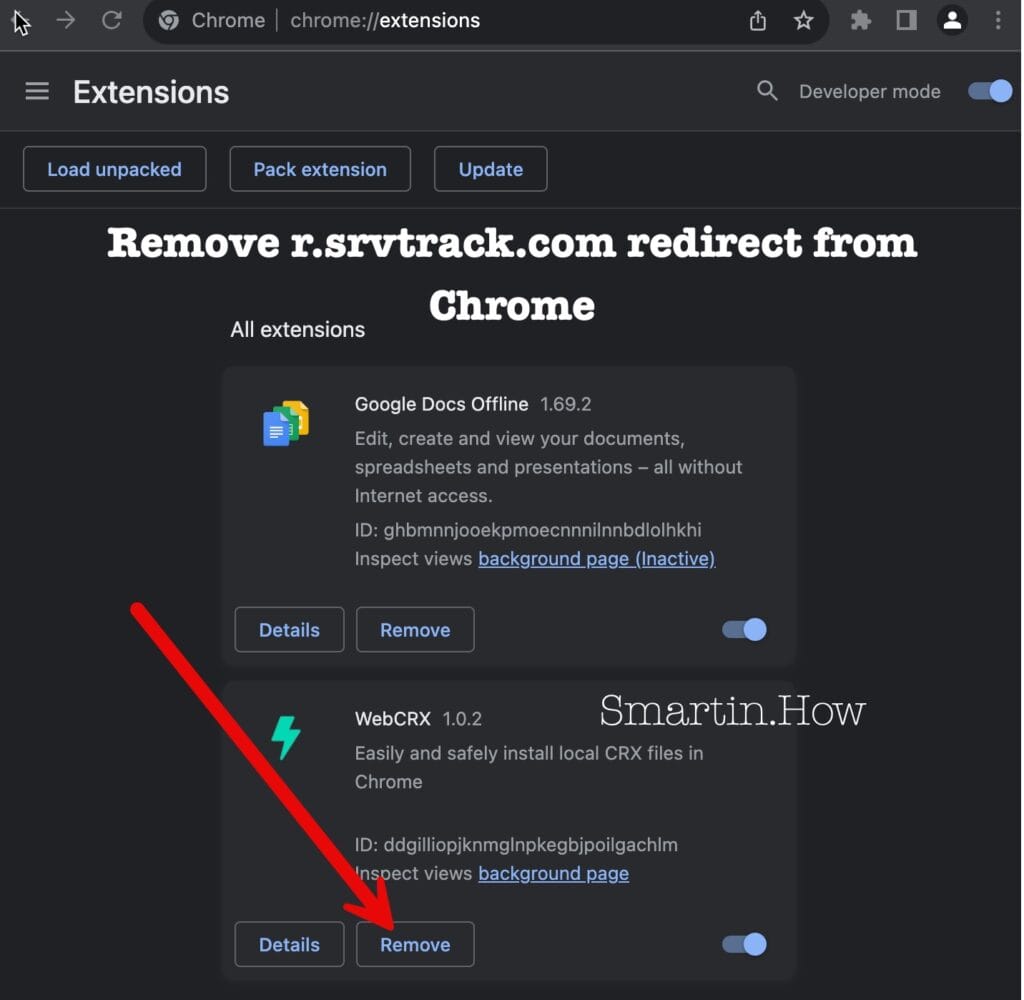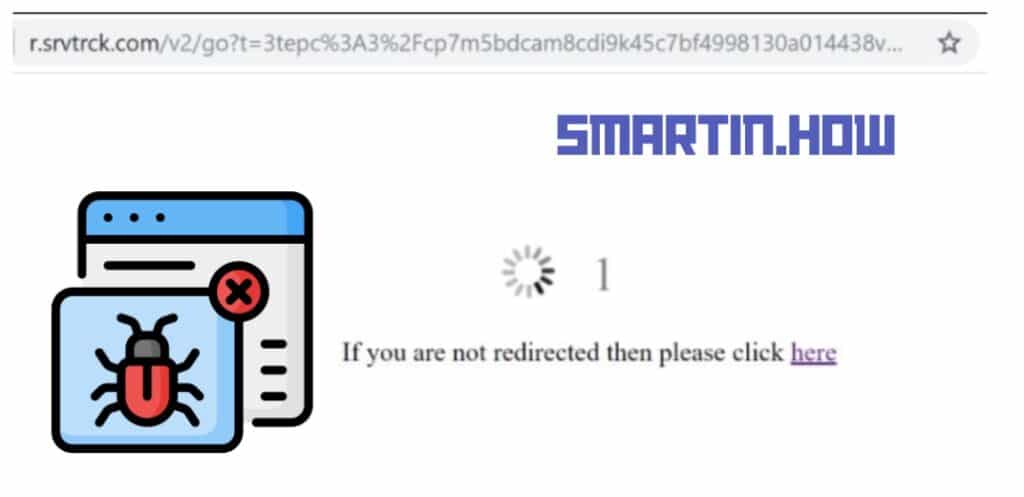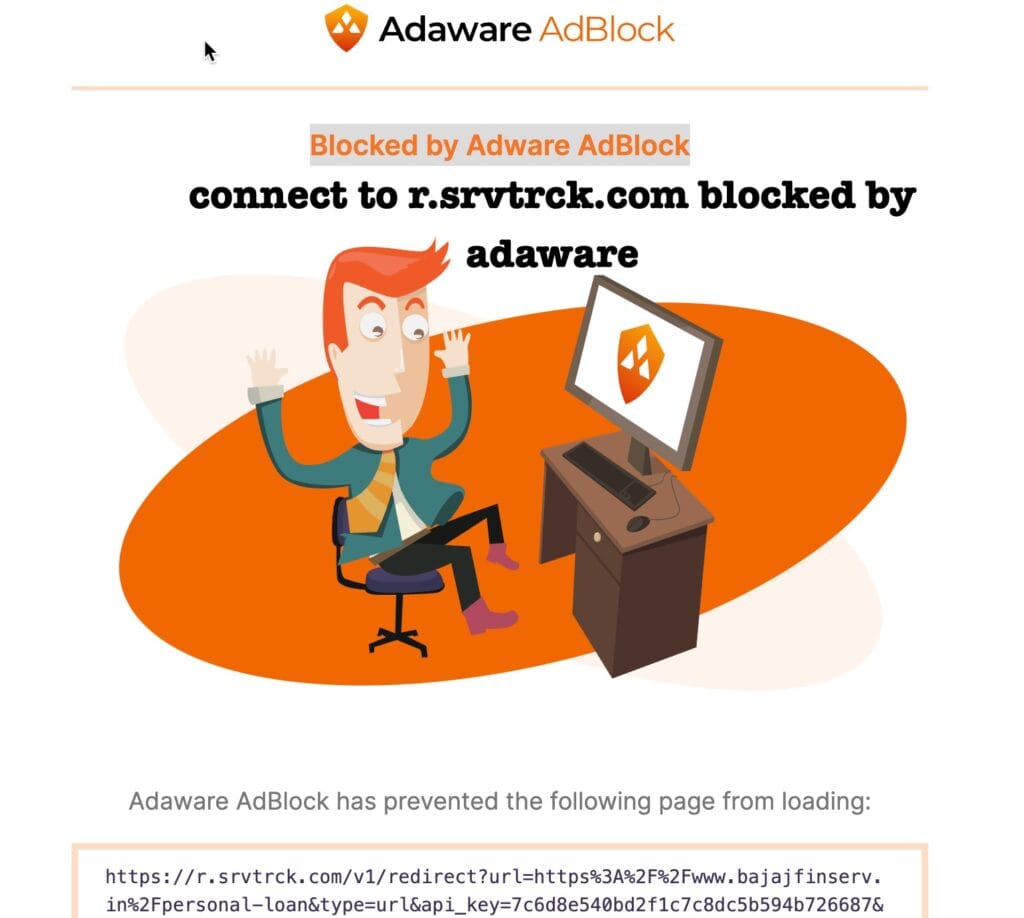How to get rid of Chrome redirects on Google search to random websites (e.g., r.srvtrck.com)
Ever had your browser redirect you to strange websites like ‘r.srvtrck.com/v2/go?=’ or other shady ad links when searching on Google as usual? Users experiencing this may be dealing with a form of adware hijacking, which affects browsers like Chrome and others built on the Chromium open-source stack (e.g., Brave, Microsoft Edge, etc.). This article explores the reasons behind such re-directs using srvtrck as an example. We’ll explain how they may have ended up in your browser and provide steps to help you get rid of them.
Chrome users on Windows or Mac can stop automatic redirects to random ad websites by finding and disabling the extension or app that injects adware or malware into the browser. For example, plugins like FileCR Assistant may contain adware-inducing JavaScript from advertising companies like Yieldkit or Linkbux, which place affiliate ads on infected browsers. Resetting the browser and using an adware blocker can also be effective on a case-by-case basis.
Though we talk about Srvtrck (a popular adware exhibiting this behaviour), you can use the suggestions mentioned here to address your specific concern.

Key facts about r.srvtrck.com redirect
- Srvtrck is adware designed to add a redirect to browsers, aiming to earn affiliate commissions from users.
- It can alter and redirect your Google/Bing search results for shopping, finance, and related keywords by automatically embedding them with affiliate codes.
- The main targets of srvtrck redirects are browser extensions or toolbars. FileCr Assistant (installed using WebCRX) is one such Chrome Extension.
- Chromebooks and all browsers are vulnerable to srvtrck hijacks.
- If manipulated with the adware script, Windows, Mac, and Android apps can cause srvtrck redirects.
- Nulled themes and plugins may lead to adware injections on WordPress, turning links into several ads.
- Reports indicate that certain freeware, VPN software, and proxies utilize srvtrck for monetisation.
- Infected browsers will load a blank web page and show a counter for a few seconds before finally redirecting to the target website.
- Sometimes, the browser may also redirect through additional advertising websites like Linkbux.com after the srvtrck timer ends.
- The redirect might not be visible immediately if the user has a fast connection. However, we can still see it as the browser loads external resources, subtly connecting to r.srvtrck.com/i.srvtrck.com in the background.
What is SRVTRCK?
Srvtrck.com is a platform operated by Yieldkit that provides web publishers with a means to earn additional revenues through their content. Their solutions enable publishers to convert links on their websites into affiliate links. Web publishers will get JavaScript that they can embed in their properties like apps, extensions, plugins, etc., and Yieldkit will turn them into profitable ads or affiliate links.
Once installed in a browser, any plugin or program bundled with Yieldkit’s affiliate tools can start redirects to r.srvtrck.com. The FileCr Assistant, an extension provided by FileCr.com, is a popular and extensively adopted example. FileCr installs the FileCr Assistant—which comes with the srvtrck adware—from outside sources using a plugin called WebCRX, available in the Google Chrome Web Store.

It appears that many publishers—including some bad actors—incorporate Srvtrck into their products; the delivery modes could differ, though. Yieldkit gives publishers total control over the srvtrck implementation process. Consequently, a publisher can inject advertising code according to their likes, wherever they choose.
Is Srvtrck malware? Should I remove FileCr assistant?
If you take the example of FileCr, they use a trusted plugin in the Chrome Web Store, WebCRX, to load an extension from an external source- which is somewhat fishy. Also, we need to grant full read and write permissions to use the FileCr Assistant to work.

Srvtrck is undoubtedly an adware designed to profit from your online visits, even though it doesn’t appear to function like a traditional malware. Yieldkit, its creator, holds some recognition and trust within the affiliate marketing community. However, their approach to managing publishers and enforcing fair usage guidelines remains unclear. It seems that some publishers exploit this system by concealing JavaScript code or modifying plugins, which ultimately results in browser hijacking in the form of auto re-directs.
Downloading plugins from outside the web store and granting full permissions poses a security risk. For this reason, we recommend removing FileCr Assistant (WebCRX) from your Chrome, Firefox, Brave, or Edge browser immediately, or at the least, deactivating it when not in use.
Steps to remove r.srvtrck.com from Chrome and other browsers.
As I mentioned earlier, publishers can distribute this adware through a browser extension, Android app, VPN, or anything similar that you could imagine. Hence, the first step to remove srvtrck is to identify the installed tool or plugin containing the Yieldkit JS code. Thankfully, the process is relatively straightforward if it’s Chrome or another web browser—all you need to do is disable or remove the extension, e.g., FileCr Assistant. Here is how to do it.
- Identify the Chrome extension hiding the srvtrck.com redirect JavaScript.
Go through your browser toolbars and extensions, and prepare a list of recent additions. The FileCr Chrome extension, Assistant, is confirmed to have this adware, but it could be another plugin as well.
- Open the Chrome extensions settings from the menu.
Click on the three perpendicular dots on the upper-right side of the Chrome browser. Now, select ‘Extensions’ and ‘Manage extensions’.
- Find ‘WebCRX’ under ‘My Extensions.
Find the ‘WebCRX‘ plugin in my extensions list. WebCRX can sideload external plugins to Chrome; FileCR Assistant uses this route to add srvtrck adware to Chrome.
- Completely remove or disable the WebCRX Assistant.
Click on the ‘Remove‘ button in WebCRX extension’s card. You can also temporarily disable this extension by pressing the slider button on the right.
Note: This will remove the srvtrck redirect created by the FileCR plugin. However, as I mentioned throughout the article, publishers can distribute srvtrck through any plugin or software. Finding the source can be challenging, but it is important for the complete removal of the adware. You can also try the alternative method given below.
Additional options to fix Srvtrck and other redirects in Google Search
I wouldn’t recommend installing an ad blocker to stop ads triggered by link clicks, such as those from srvtrck. This is because ad blockers, such as Adaware, detect and may completely block adware redirects, so you won’t be able to access the target site at all, as shown below. However, you can use an antivirus software like Kaspersky (30-day trial) to scan and secure you PC/Mac.

If the browser extension or app causing the suspicious redirect cannot be found, consider resetting the browser. Chrome users can type ‘chrome://settings/reset’ in the URL bar to reset the browser settings and start fresh. Do not sync extensions initially; instead, reinstall them one by one, testing the browser’s behaviour after each installation.
Conclusion
In conclusion, to prevent srvtrck and similar adware that cause browser hijacking symptoms, refrain from downloading extensions from sources outside the official browser app stores. Be mindful when installing new software such as toolbars, assistants, freeware, VPNs, etc., from unfamiliar sources. If you suddenly find your browser triggering automatic link redirects in search engine results, it is reasonable to assume that a recent change in the browser has added it. Take immediate action to locate and remove that application from your browser or system.
FAQs on srvtrck malware
If a user has an adware blocker (e.g., uBlock, AdGuard) or internet security (e.g., Avast) installed on their device, it will block access to srvtrck redirects, considering it as malware. Hence, they will see the message ‘Access to r.srvtrck.com was denied.’ This will effectively prevent further access to the target website (as the redirect is blocked), causing an unpleasant experience.
Website owners may sometimes see r.srvtrck.com as a referral to their site in Google Analytics. This is due to the redirects that Yieldkit has injected into users’ browsers through extensions and apps.





Thank you, I was able to fix the redirects completely after removing the mentioned extension. I also installed the FileCr to download some software from their website and had to install the webcrx extension to get the premium files. I installed it because it had a very good rating, above 4 stars. Since then, the extension has remained on my browser, and recently, I have noticed that whenever I search to buy something online, everything redirects to this suspicious domain called r.srvtrck. com, then, just a few seconds later, to the domain I intended to visit. I didn’t know that it was an adware.